|
Tip of
the Week Archive |
| Subscribe | Contact Fermilab Today | Archive | Classifieds |
Every Monday, a new Tip of the Week appears in
Fermilab Today, Fermilab's daily email publication for employees,
users and subscribers.
Tips of the Week Archive – 2013
| December 16, 2013 | ||
| Using obsolete software | ||
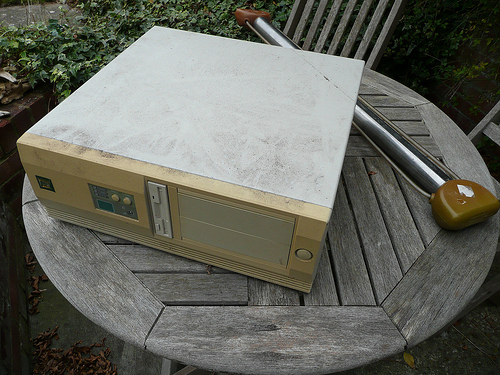
Has this ever happened to you? You have some computer software, either an operating system or an application, that has been working reliably for you for many years. Suddenly you receive a notice that the version of the software you are using is no longer supported and that you need to update to a more modern version. You follow instructions and successfully install the updated software. But then all sorts of things start going wrong: Previously working applications break, and the new look and feel is completely irritating. You resolve never to update working systems again. |
||
| December 09, 2013 | ||
| Keep the holidays fun and safe | ||
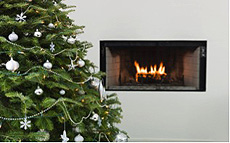
The holiday season brings many joys, such as family gatherings and festive decorations. However, it also brings hazards. Flickering candles, blinking lights and fragrant evergreens are beautiful staples of the holiday season, but when used improperly, these holiday decorations can pose dangers. According to the U.S. Consumer Product Safety Commission, each year during the winter holiday season, about 11,000 people are treated in emergency rooms because of decoration-related injuries, with falls, cuts, shocks and burns topping the list. |
||
| December 02, 2013 | ||
| The right stuff for dealing with the white stuff | ||
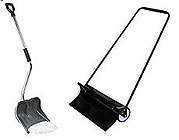
Snow can be beautiful, but we generally don't want it to linger on our sidewalks and driveways. At the same time, removing it presents challenges, including for our hearts and backs. Heavy snowfall appears to correlate with an increase in the incidence of heart attacks and back strains. Medical science backs up, to a degree, the risk of a heart attack while shoveling snow. |
||
| November 25, 2013 | ||
| Return of the savanna | ||
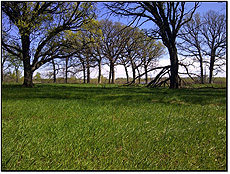
In 1975, with the creation of a few acres of prairie restoration, Fermilab became a center for ecological renewal and conservation. Nearly 40 years later, a network of volunteers and dedicated ecologists remain committed to preserving rare plant communities and the rich biodiversity they support. Since 2006, Fermilab Natural Areas (FNA), a not-for-profit corporation based at Fermilab, has been engaged in restoring one of the most endangered habitats in the Midwest — oak savanna. The Fermilab campus is blessed with several acres of remnant savannas, most of which is degraded to some level. From the beginnings of FNA, its keystone project was the restoration of the 35-acre oak savanna remnant in the center of the Tevatron ring. |
||
| November 18, 2013 | ||
| Check and double-check | ||

Did you ever skip making a list because the task was so easy even a caveman could do it? Sometimes people think forgetting doesn't happen to them. But forgetfulness happens no matter how young, old or smart we are. That is why we should make and use checklists. Checklists are one of many standard practices we use to ensure we consistently achieve a desired result. Just as airplane pilots use preflight checklists, professionals at Fermilab use checklists to make sure that we accomplish a certain activity, that items are in a specific order and that the job is complete and correct. This also helps avoid costly errors and failures, which generally exceed appraisal costs and may exceed both prevention and appraisal costs depending on severity of the failure. |
||
| November 11, 2013 | ||
| Computer Security Awareness Day takes place tomorrow | ||
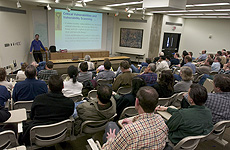
The most important component of our computer security defenses is an informed and aware user community. To strengthen this defense, Fermilab holds an annual Computer Security Awareness Day, where training is provided to the user community. This year's event will take place tomorrow, Tuesday Nov. 12, in Wilson Hall. There will be two categories of presentations. First, all of the ITNA-required cybersecurity and privacy courses will be offered as lecture classes in the morning, allowing employees, visitors and contractors to meet their training requirements without having to take an online test. |
||
| November 4, 2013 | ||
| Before and after you turn those keys, look 360 degrees | ||
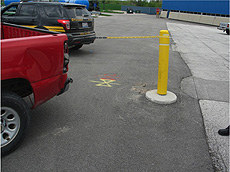
Although we at Fermilab ended fiscal year 2013 with our lowest injury rate in years, the rate of vehicle accidents rose. Backing accidents accounted for over 50 percent of all vehicle accidents for the past two years. While most vehicle accidents at Fermilab involved only property damage, bodily injuries have been recorded in the past. |
||
| October 28, 2013 | ||
| The ABCs of viral hepatitis | ||
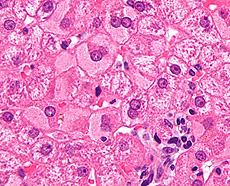
I often get questions about vaccinations from individuals planning to travel, and most of these are about hepatitis, the general term for liver inflammation. In this case the inquirers are asking about protection from viral hepatitis, as contrasted with drug-, toxin- or alcohol-induced hepatitis. When the liver becomes inflamed, it cannot effectively clear toxins, the body's waste products or some medications. Urine may become dark as the kidneys attempt to clear these items. Skin, eyes and nail beds may become yellow (dark-complexioned individuals may only notice the latter two). The end result is fatigue and many body system stresses. |
||
| October 21, 2013 | ||
| Waste reduction: more economical, cleaner, safer | ||
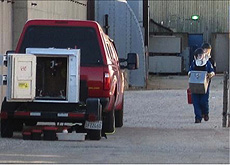
Regardless of which listing of environmental liabilities you look at, waste in its various forms is always high on the list. Part of the reason for this is that waste contributes to many other issues. Many chemicals contain volatile components that contribute to ozone depletion or climate change if they are not managed correctly. Poorly managed excess chemicals can escape and create water and air pollution, eventually leading to a decrease in habitat quality and ecosystem degradation. |
||
| October 14, 2013 | ||
| National Fire Keeping your experiment on the Internet | ||

With Fermilab's accelerator complex getting into operation again, experiments are running data acquisition systems. Sometimes these must be configured rapidly to take advantage of limited time available in test beams. |
||
| October 07, 2013 | ||
| National Fire Prevention Week: Preventing Kitchen Fires | ||
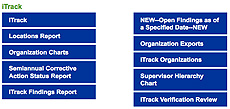
Fire Prevention Week is Oct. 6-12, and the National Fire Protection Association 2013 Fire Prevention Week theme is "Preventing Kitchen Fires." According to the U.S. Fire Administration, NFPA and the Consumer Product Safety Commission, the leading cause of home fires is from unattended cooking equipment. More fires start in the kitchen than in any other part of the home. U.S. fire departments responded to an estimated annual average of 156,600 cooking-related fires between 2007 and 2011, resulting in 400 deaths, 5,080 injuries and $853 million in direct damage. | ||
| September 30, 2013 | ||
| Tracking issues at Fermilab | ||

Fermilab is subject to a rigorous schedule of reviews, inspections, assessments and audits. These range from internal inspections and self-assessments to regulatory audits required by state or federal agencies to formal reviews conducted by the Department of Energy or the FRA board. A number of methods for tracking the results of these examinations have been employed over the years, and this made it very difficult to track the status of findings across the laboratory in an organized and efficient way. | ||
| September 23, 2013 | ||
| Fermilab ESH&Q communication programs | ||
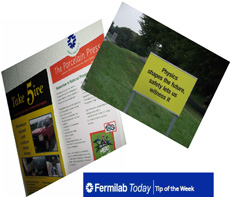
To communicate environment, safety, health and quality assurance issues, the ESH&Q section works in collaboration with the Fermilab Office of Communication, site entry safety slogan team, Take Five for Goal Zero team and Clorica Management Services. Together we have created programs that are intended to educate, inform and remind everyone of environment, safety and health hazards; incidents and lessons learned; and preventive actions through the publication of articles, posters, quizzes and challenges, Web pages and slogans. The myriad ways we communicate include the Porcelain Press, the ESH&Q Tip of the Week in Fermilab Today and site entry safety slogan signs. | ||
| September 16, 2013 | ||
| Fermilab prairie seed harvests take place in fall | ||
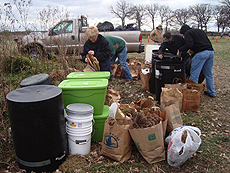
Next month Fermilab will host the first of two public prairie seed harvests as we have done for over 30 years, almost since the birth of the prairie reconstruction project in 1975. FESS Roads and Grounds has hosted the annual event, and for the last five years, Fermilab Natural Areas has co-hosted. Volunteers from many surrounding communities come to the lab for the four-hour event, and many have faithfully attended every harvest for decades. During the event, participants learn which plant species are needed and how to identify them in the field. Armed with scissors, gloves and paper bags, they set off to locate plants and collect the seed heads. When they return to the staging area, they add their bounty to that collected by other volunteers, then go out again after more. | ||
| September 9, 2013 | ||
| What's new with the flu? | ||
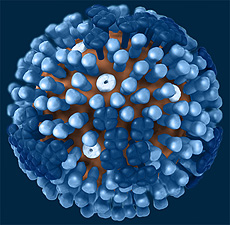
The Center for Disease Control has announced the new vaccines for the coming flu season. The vaccines' formulation is based on a best guess as to which of last year's flu strains will return to trouble us this season. There are a number of vaccine types being proffered this year. The target strains in common for all vaccines are: A/California/7/2009 (H1N1)-like virus A/H3N2 virus, antigenically like the cell-propagated prototype virus A/Victoria/361/2011 B/Massachusetts/2/2012-like virus (Yamagata lineage) | ||
| August 26, 2013 | ||
| Staying Safe on the Web | ||
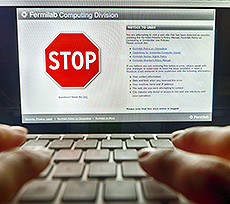
The Internet these days is a dangerous place, especially when surfing the Web, where a single click on the wrong link can infect your computer with viruses or malicious spyware or adware. You should always be wary when you’re on the Web. The Fermilab computer security team operates services that provide some protection. First, each time you attempt to access the Web using the Fermilab network, the request goes through a web proxy server. | ||
| August 19, 2013 | ||
| Sign, sign, everywhere a sign | ||
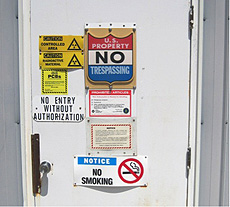
We have a lot of signs at Fermilab. The above photo is just one example: a single door displaying numerous signs referring to a particularly large variety of hazards. It's also an example of the measures we take to be responsible stewards of government property. The example may seem extreme, but all of the posted instructions are needed on this door. Because we often see the same signs and labels day after day, we do not always read them. Not reading or not following posted instructions is risky behavior, especially since situations can change—and change is a constant at Fermilab. | ||
| August 12, 2013 | ||
| Sign up for a GreenRide and cash in | ||
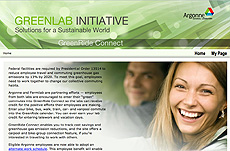
Want to save money, make new friends and help the planet at the same time? A website called GreenRide Connect, run by Argonne National Laboratory, enables you to locate fellow employees with similar commutes to ride together to and from work. You can also track your cost savings and greenhouse gas (GHG) emission reductions through the website whether you travel by train, car or bicycle. (You can connect with the site through the Fermilab Sustainability website as well.) Go to the website and sign up by Aug. 26, and you'll be entered into a drawing for a $100 gas gift card. | ||
| August 05, 2013 | ||
| Keeping quality assurance simple: a new lessons learned program at Fermilab | ||
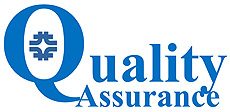
Here at Fermilab we believe that safety and quality go hand in hand, and we work hard to integrate both into our everyday activities. "Just as with safety, quality assurance is also everyone's responsibility," says recently hired Quality Assurance Specialist Kathy Zappia. "We should think about quality assurance as we plan and perform our daily activities, not just when an audit or assessment is coming up." | ||
| July 29, 2013 | ||
| Top off your fluid level to beat the heat | ||
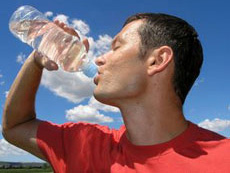
It's summer in Chicago, and that means heat and humidity, which can pose challenges for exercising. If you are unaccustomed to exercising in these conditions, give yourself a chance to acclimate by building up your workout routine. It generally takes about two weeks for the body to fully adapt to warm weather. The body typically cools itself by increasing surface blood flow or, on a windless day, relying on mainly evaporation. Add humidity, and our body's air conditioning system is severely taxed. Maintaining hydration can help. Electrolyte replacement is critical for ultra-endurance events, but for most, the normal diet allows the body to catch up on losses through perspiration. | ||
| July 22, 2013 | ||
| Cybersecurity incidents | ||
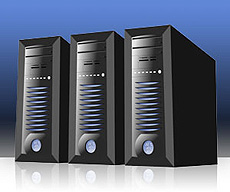
We do not have many cybersecurity incidents at Fermilab, but when we do, it is useful to examine their root causes and draw lessons on how we can improve our security practices. Minor incidents, like a virus infection on a single machine, are expected to happen with modest frequency and don't necessarily require extreme scrutiny. But unusual and unexpected occurrences, such as an incident we had last week, do require rigorous examination. Last week's incident began with a Web server offering Plone services. Plone is a popular mechanism for sharing documents with authorized individuals, as well as providing managed workflows. There are several instances of Plone in use at the laboratory. | ||
| July 15, 2013 | ||
| Sharing the road with bicyclists at Fermilab | ||
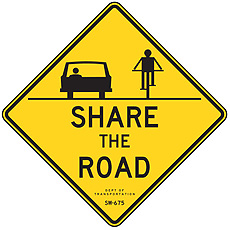
The warm weather brings many cyclists to Fermilab, increasing the chances of collisions with motorists. To minimize this risk, Fermilab's ESH&Q Section and the Traffic Safety Subcommittee (TSS) urge everyone to be aware of this issue and follow the Illinois Rules of the Road. These rules apply to motorists and cyclists, and they are enforced at Fermilab. Fermilab stresses to employees that they must watch for bicyclists and respect bicyclists' rights to share the road. Fermilab has turned its attention to bicyclists because of complaints that some of them ride through stop signs without stopping or looking for oncoming traffic. There have also been complaints that some cyclists ride more than two abreast, taking up a full lane or more. The Illinois vehicle code (625ILCS 5/11-1505.1) states that "persons riding two abreast shall not impede the normal and reasonable movement of traffic." | ||
| July 08, 2013 | ||
| Save your skin this summer | ||

A suntan may look attractive, but skin damage and cancer can leave behind a permanent reminder of summers past. Some simple measures can help save your skin from ultraviolet-light medium waves (UVB), which cause sun burns, and long waves (UVA), which accelerate skin aging. The best precaution is to monitor when you expose your skin to sun. High-risk times are from 10 a.m. to 3 p.m., as UVB intensity peaks then. When in doubt about the local UV peak, apply this rule of thumb: If your shadow is shorter than your height, be wary of sun exposure. | ||
| July 01, 2013 | ||
| Fire safety for a happy summer | ||

Every year Americans look forward to summer vacations, camping, family reunions, picnics and the Fourth of July. Summertime, however, also brings fires and injuries due to fireworks and outdoor cooking. Knowing a few fire safety tips and following instructions will help everyone have a safer summer. | ||
| June 24, 2013 | ||
| Fermilab: where physics meets ecology | ||
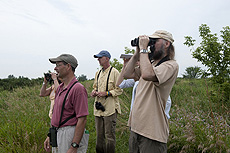
Fermilab is a unique federal facility, not only because of its mission to explore the most basic properties of the universe, but because our 6,800 acre campus is open and accessible for the public to enjoy the site's many natural areas by walking, biking, birdwatching or photographing nature. The Fermilab grounds are a green island in a region of intense development. The lab has areas of tallgrass prairie, woodlands and wetlands as well as civil construction and row crop agriculture. The site sits astride three watersheds, feeding the DuPage and Fox rivers. It is really a microcosm of the northern Illinois landscape. | ||
| June 17, 2013 | ||
| APTs: The bad guys have us in their sights | ||

You have probably seen recent stories in the news about organized cyberspace attacks on U.S. financial and government institutions. The perpetrators of these attacks are often known as advanced persistent threats, or APTs: advanced, because they make use of sophisticated hacking toolkits; persistent, because they conduct their attacks over extended periods of time, including separate phases for reconnaissance, infiltration and data exfiltration; and threats, because they are up to no good. | ||
| June 10, 2013 | ||
| Leveraging safety and quality programs at Fermilab | ||
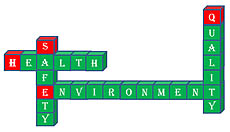
As you may already know, the Office of Quality and Best Practice has transitioned to become the QA, Training & Communications group within the Environment, Safety, Health & Quality Section. Under the direction of a new quality assurance manager, Fermilab is taking steps to integrate QA functions and services with our existing ES&H program. This will serve to leverage the capabilities of both programs to meet common goals and outcomes for the laboratory. | ||
| June 03, 2013 | ||
| Is it hot in here, or is it just me? | ||

Tracking carbon dioxide, or CO2, in the atmosphere has been a compelling job for scientists around the globe for the last 50 years. Since the Pliocene era, roughly 800,000 years ago, the CO2 concentration in the atmosphere has remained relatively stable, cycling between 200 and 300 parts per million. However, since the late 18th century, CO2 levels have risen sharply. In early May of this year, NOAA scientists at their observatory in Mauna Loa, Hawaii, recorded a CO2 concentration of over 400 ppm for the first time in modern history. The increase in CO2 since the industrial revolution is largely due to human activities such as burning fossil fuels and mining carbonate rock. The increase is troubling because of the role CO2 plays in global climate change. | ||
| May 20, 2013 | ||
| May is Electrical Safety Month | ||
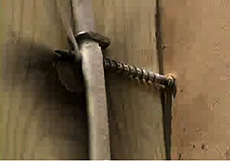
May is Electrical Safety Month, and this year Fermilab's Electrical Safety Subcommittee would like to make you aware of two places online where you can learn more about how to be safe around electrical equipment. The first is the Fermilab ES&H Manual (FESHM) chapters dealing with electrical safety. They can be found on the ESH&Q FESHM Web page under the 5000 Series chapters (Occupational Safety and Health). The electrical chapters are FESHM 5040 through 5048 and 5120. | ||
| May 13, 2013 | ||
| Tick activity this season | ||
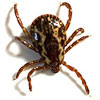
The warmer months encourage people to venture into wilderness areas, thus increasing insect encounters, including tick bites and the tick-borne Lyme disease. The latest CDC data report that there have been about 30,000 Lyme disease cases per year nationwide, with almost all cases occurring in an 18-state area, including Illinois. The number of those infected appears to be much higher than previously and perhaps increasing year to year, though not everyone becomes ill. | ||
| May 06, 2013 | ||
| Virus vigilance in Fermilab computing | ||
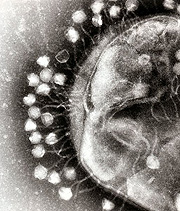
Fermilab's mission to advance particle physics research relies heavily on the secure operation of the lab's computing resources. In order to enable this mission and ensure that scientific work proceeds smoothly, we do not have zero-tolerance policy on computing security incidents. Restricting computing activities to a level such that we would never have a security incident would prevent the communication and interaction that our science requires. But this means that when we detect a potential incident, it is critical that we respond rapidly and effectively to make sure that the incident is contained and any damage is localized. There are sets of specific procedures to be followed for different types of incidents, procedures designed to provide this containment and damage limitation. | ||
| April 29, 2013 | ||
| Know your vehicle | ||
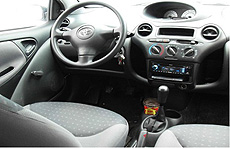
Recently, two DOE contractors at outside DOE facilities failed to disengage the transmission of the government vehicle they were operating prior to exiting their vehicle. In a third incident, a DOE contract employee, with the car transmission engaged, fell out and was subsequently run over by the vehicle he was operating. Investigations revealed that in all three cases, lack of familiarity with the vehicle contributed to the cause of these incidents. ESH&Q recommends that prior to operating any vehicle you are unfamiliar with, Take 5 to review the operator's manual and to identify where operational controls | ||
| April 22, 2013 | ||
| Summertime and the living need not be sneezy | ||
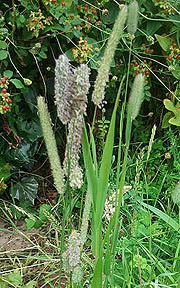
We welcome summer but perhaps not its allergy issues. Predominant pollens vary across the country, so if you are new to the area, you may notice a "cold" that doesn't leave—a runny nose and itchy eyes might be among the symptoms—as temperatures warm. There are ways to enjoy the outdoors with some observations and planning. The time of year that you have allergy problems can give you a clue as to the offender: Late winter and spring: trees—in particular, birches, elms, willows, oaks and maples, to name a few Late spring and early summer: grasses Late summer and fall: weeds such as ragweed Once you know the culprit, you can plan your day by watching the pollen and mold forecasts online, on TV or in the paper. Typically pollen levels decline in early morning or late evening. A thorough downpour will also cleanse the air. | ||
| April 15, 2013 | ||
| Don't drive distracted | ||

Driver distractions have joined alcohol and speeding as leading factors in fatal and serious injury crashes. A distraction is any activity that could divert your attention away from the primary task of driving, including but not limited to: - Using a mobile communication device, for example, talking or texting - Adjusting a radio, CD player or MP3 player - Looking away from the road | ||
| April 08, 2013 | ||
| Protecting migratory birds | ||
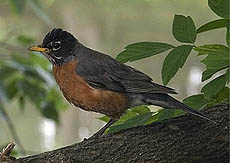
For most people, protecting wildlife means taking account of endangered-species lists published by federal and state wildlife agencies. Species on these lists are those whose very existence is threatened, usually due to human activities. These lists are relatively short, and they contain species that are, almost by definition, uncommon. | ||
| April 01, 2013 | ||
| Spam, spam, eggs and spam | ||
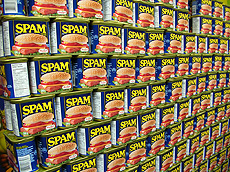
Fermilab e-mail accounts are frequent targets for spam, especially phishing attempts that try to convince careless users to reveal information such as user names and passwords about themselves to attackers. Last week many laboratory users were on the receiving end of a phishing attack, so it is timely to remind users of a few precautions. | ||
| March 25, 2013 | ||
| Fermilab's e-cycling program, helping the environment | ||
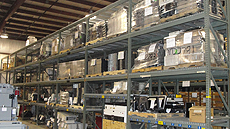
Recycling at Fermilab involves much more than sorting paper, plastic or cans from the trash, especially when it comes to the lab's electronic waste. Electronic equipment often contains lead and other hazardous materials that can make traditional recycling methods difficult and costly. Fermilab's electronics recycling, or e-cycling, program ensures environmental safety and is economically beneficial to the lab. | ||
| March 18, 2013 | ||
| Overheating power strips | ||
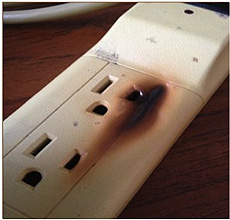
According to the National Safety Council, electrical failure is the cause of more than 140,000 fires each year, resulting in 400 deaths, 4,000 injuries and $1.6 billion in property damage. In the work place, electrical hazards cause nearly one fatality every day in the United States. Multiple-outlet power strips (pictured) can fail. People also sometimes use them improperly. One such instance occurred after a Fermilab employee returned from the holidays. He noticed that the power strip in his office had burn marks near the outlet into which a small power adapter was plugged. He unplugged the power adapter, which tripped the breaker on the power strip as well as the breaker panel on the wall. Members of Fermilab's Electrical Safety Subcommittee determined that an internal connection had oxidized and had begun slowly heating over time enough to discolor and soften the plastic. | ||
| March 11, 2013 | ||
| Over the top | ||

Baseball and tennis season is beginning, and whether you play or not, you can take away from the field and court tips to make your life safer and healthier. Have you ever noticed pitchers and serving tennis players tilt their shoulders so that the shoulder opposite the ball or tennis racket is dipped? There is an advantage to that form. Observation shows that in dipping the shoulder, the space between the neck and raised arm is widened when compared to raising the arm overhead with shoulders level. This dipped position leads to less pressure on the nerves of the neck. Some physicians feel that this position also places less strain on the rotator cuff, the series of tendons attached about the shoulder socket. This same position also can more effectively stretch the neck and shoulder muscles during warm-up. So how do you put this tip from athletes into practice? Although you should try as much as practical to engineer things so you don't need to reach overhead, if you must, dip the shoulder opposite your reaching arm. This may save you some wear and tear. | ||
| March 04, 2013 | ||
| Can the smart grid make us smarter? | ||
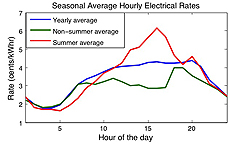
Let's think for a moment about electrical energy as a commodity. Generally, commodities that are easily stored have a fairly stable price, while items like fresh fruit have wide price swings with seasonal changes in supply and demand. Electrical energy is very hard to store, and the demand for energy varies over both the seasons and the time of day, as shown in the figure above. On the supply side, power plants may be down for maintenance or demand may push the systems' maximum capabilities. These factors lead to high volatility in the real-time electric trading market. | ||
| February 25, 2013 | ||
| Intrusion detection: it's not just about viruses | ||

If you have ever spent time watching homemade videos on television or online, you have probably seen many examples of people slipping, tripping and falling. While these videos may seem comical, slips, trips and falls are no laughing matter. Falls are one of the leading causes of unintentional injuries in the United States, accounting for nearly 8.6 million visits to emergency departments, according to Injury Facts, 2011. What can we do to help prevent slips, trips and falls? First, be aware of the locations where most falls occur: | ||
| February 18, 2013 | ||
| Slipping and falling is no laughing matter | ||

Most laboratory users are well aware of the virus-checking applications that run on their laptops and desktops to detect and remove harmful software. But a single weapon is not enough. Instead we rely on defense in depth, which makes use of a variety of applications at many levels to protect lab computers and data. | ||
| February 11, 2013 | ||
| Properly disposing of your home smoke detector | ||
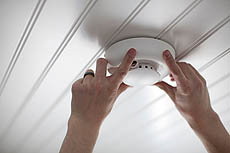
As conscientious Fermilab employees, we are aware that not all waste can be thrown in the trash bin. Certain products, such as many chemicals or radioactive items, fall under strict regulations that determine their methods of disposal. Awareness of these regulations and the desire to correctly dispose of regulated items in a responsible way translate to our homes. Our home smoke detectors are one such item. They contain a small radioactive source made of americium-241. It is not a very powerful source and emits much less radiation at one meter than is already present at normal background levels. | ||
| February 04, 2013 | ||
| Is this water safe to drink? | ||
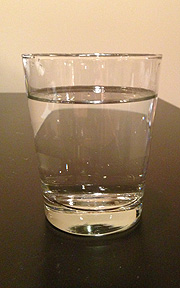
It's easy to take water for granted. We expect clean, clear and safe water whenever we turn on the tap. But whether the water comes from deep underground or a surface water source, getting it to you involves a lot of engineering and science. "Raw" water has to be treated using filtration and chemicals, then pumped to consumers through a system of mains over a broad area. The quality of water that is delivered to the end user depends on many variables—the quality of the source, the degree of treatment and the condition of the piping systems all the way from treatment to the faucet. Water quality questions related to Fermilab's distribution system arise on occasion. Obviously, the most important quality of drinking water is its safety. When we think of "bad" water, we're usually worried about microorganisms that make us sick. Fermilab purchases water from the City of Warrenville, and like most public water supplies, the water is chlorinated. Free chlorine in the water quickly gets "used up" through biological and chemical reactions and becomes "combined" chlorine. While chlorine in the free state is a powerful disinfectant, maintaining a sufficient residual concentration of combined chlorine is just as effective at keeping drinking water safe. | ||
| January 28, 2013 | ||
| Bean jumpy? | ||
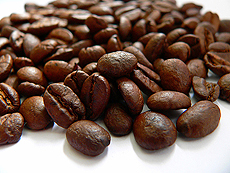
An estimated 90 percent of North American adults consume caffeine. Increased caffeine intake can cause irritability, jumpiness and, more seriously, heart rhythm disturbances. Although consuming too much coffee can lead to unhealthy caffeine levels, coffee isn't the only culprit. Drugs such as Luvox, used to treat depression, or quinolone antibiotics, used to treat infection, amplify caffeine blood levels five-fold by tying up an enzyme pathway shared with caffeine. | ||
| January 14, 2013 | ||
| New certificates for the new year | ||

If you ever need to securely identify yourself on the Internet, you need to be aware of upcoming changes involving certificates. Both individuals and computers that use certificates to identify themselves to others must take action soon, as the DOEGrid Certificate Authority (CA) is about to turn off. After March 1 it will no longer issue or renew certificates, and so lab users who need new or renewed certificates will need to get them elsewhere. (Note that any existing DOEGrid certificates will remain valid for their full lifetime.) | ||
| January 7, 2013 | ||
| Oxygen-deficiency hazards | ||

What does ODH stand for?
A. Ohio Department of Health The correct answer is E, but at Fermilab the answer that matters is D. | ||
Safety Tip of the Week - Current Archive
2014 Safety Tip of the Week Archive
2013 Safety Tip of the Week Archive
2012 Safety Tip of the Week Archive
2011 Safety Tip of the Week Archive
2010 Safety Tip of the Week Archive
2009 Safety Tip of the Week Archive
2008 Safety Tip of the Week Archive
2007 Safety Tip of the Week Archive
2006 Safety Tip of the Week Archive
2005 Safety Tip of the Week Archive
2004 Safety Tip of the Week Archive
Return to Current Fermilab Today